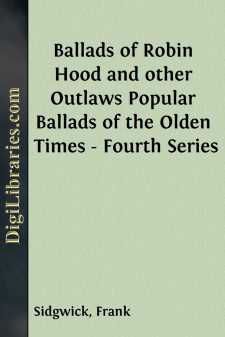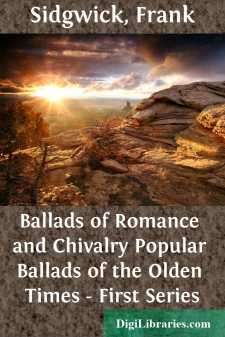Categories
- Antiques & Collectibles 13
- Architecture 36
- Art 48
- Bibles 22
- Biography & Autobiography 813
- Body, Mind & Spirit 142
- Business & Economics 28
- Children's Books 15
- Children's Fiction 12
- Computers 4
- Cooking 94
- Crafts & Hobbies 4
- Drama 346
- Education 46
- Family & Relationships 57
- Fiction 11829
- Games 19
- Gardening 17
- Health & Fitness 34
- History 1377
- House & Home 1
- Humor 147
- Juvenile Fiction 1873
- Juvenile Nonfiction 202
- Language Arts & Disciplines 88
- Law 16
- Literary Collections 686
- Literary Criticism 179
- Mathematics 13
- Medical 41
- Music 40
- Nature 179
- Non-Classifiable 1768
- Performing Arts 7
- Periodicals 1453
- Philosophy 64
- Photography 2
- Poetry 896
- Political Science 203
- Psychology 42
- Reference 154
- Religion 513
- Science 126
- Self-Help 84
- Social Science 81
- Sports & Recreation 34
- Study Aids 3
- Technology & Engineering 59
- Transportation 23
- Travel 463
- True Crime 29
Ballads of Robin Hood and other Outlaws Popular Ballads of the Olden Times - Fourth Series
by: Frank Sidgwick
Categories:
Description:
Excerpt
PREFACE
This volume concludes the series, begun in 1903, which was intended to comprise all the best traditional ballads of England and Scotland. The scheme of classification by subject-matter, arbitrary and haphazard as it may seem to be at one point or another, has, I think, proved more satisfactory than could have been anticipated; and in the end I have omitted no ballad without due justification.
In the fourteen years which have elapsed since the completion of Professor Child’s collection, there has been discovered, so far as I know, only one ballad that can claim the right to be added to his roll of 305 ‘English and Scottish Popular Ballads.’ That one is the carol of The Bitter Withy, which I was fortunate enough to recover in 1905, which my friend Professor Gerould of Princeton University has annotated with an erudition worthy of Child, and the genuineness of which has been sponsored by Professor Gummere. I should perhaps have included this in its place in my Second Series, had I known of it in time, but I still hope to treat the traditional English Carols separately. I ought to admit here that the confidence with which I claimed, in my Third Series, a place on the roll for The Jolly Juggler, has abated, and I now consider it to be no more than a narrative lyric without any definitely ‘popular’ characteristics.
These four volumes contain in all 143 ballads, four of which are not to be found in Child’s collection. Thus, out of his 305, I have omitted more than half; but it must be remembered that his work was a collection, and mine—si parva licet componere magnis—has been selection. The omitted ballads are either:—
(i) Fragmentary or mutilated;
(ii) Closely related to ballads which I include;
(iii) Uninteresting, e.g. as dealing with obscure history;
(iv) Degenerate.
The last reason for exclusion particularly affects the Robin Hood ballads, among which Child prints thirty-three late broadsides and fragments which I omit. He preferred to err by inclusion rather than exclusion, and states that he has admitted more than one ballad, ‘actually worthless and manifestly spurious, because of a remote possibility that it might contain relics, or be a debased representative, of something genuine and better.’
I cannot take leave of nine years’ intermittent work on this selection without remembering that its ‘only begetter’ was Mr. A. H. Bullen, with whom I published the first three volumes. While I regret to think how different it is in the result from the edition he then envisaged, I gratefully acknowledge my indebtedness to him for the inoculation. The anthologist is strictly a plucker of the flowers of literature; but the ballads are not literature—they are lore, and therefore of warmer human interest.
F. S.
The Popular Ballad (1907), p. 228.
These are The Nutbrown Maid, First Series; The Lyke-Wake Dirge and Adam, Second Series; and The Jolly Juggler, Third Series.
Vol. v. p. 182.
INTRODUCTION TO THE ROBIN HOOD BALLADS
‘It is our olde manner,’ sayd Robyn,
‘To leve but lytell behynde.’
‘It will scarcely be expected that one should be able to offer an authentic narrative of the life and transactions of this extraordinary personage....



